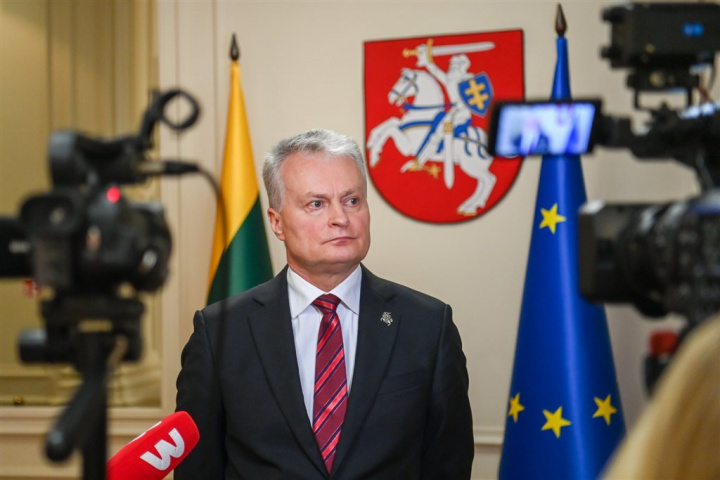
Vilnius/Taipei, Jan. 5 (CNA) The Lithuanian president's criticism on Tuesday of his country's decision to allow the opening of a Taiwan representative office with "Taiwanese" in its name was more a reflection of a power struggle within the Baltic state's domestic politics than a change in the country's Taiwan policy, experts on the issue told CNA.
Raigirdas Boruta, an associate expert at Lithuanian think tank, Eastern Europe Studies Centre (EESC), said that tense relations between President Gitanas Nausėda and Prime Minister Ingrida Šimonytė had continued to heat up since the cabinet led by Šimonytė assumed office in December 2020.
"This recent statement by the President of Lithuania came as a surprise to many people in the country. Since the new cabinet started its tenure, the cabinet's relationship with the president has been quite tense and complicated," he said.
"Recently, this friction has become more intense as the president is more vocal in his criticism towards the Šimonytė government," he said, adding that the president often highlighted the fact that he was rarely consulted on the cabinet's foreign policy-related decisions.
Sharing a similar view, Marius Laurinavičius, a Lithuania-based expert on Russia, international affairs and security, told CNA that given the sensitivity of the cross-strait issue in the Baltic state now, it is not unlikely that Nausėda was deliberately bringing up the topic in an attempt to raise his own popularity rating.
Laurinavičius considered Nausėda's remarks "a very big foreign mistake." Bringing this ongoing political fight to the world stage will weaken the Lithuanian international position substantially, he added.
In Taipei, Marcin Jerzewski, a Polish research fellow at local think tank Taiwan NextGen Foundation, where he leads the New Southbound Policy research program, said that in the Lithuanian political system, the president is the head of state of the country and oversees foreign and security policy.
The prime minister, appointed by the president, is the head of government of the country and is responsible for domestic affairs.
However, in practice, the duties of the president and prime minister are somewhat murky, he noted.
Nausėda's comments are not unusual within the context of Lithuania's semi-presidential democracy, where conflicts between prime ministers and presidents are common.
Nausėda and Šimonytė are in fact political opponents and squared off in the 2nd round of Lithuania's 2019 presidential elections, Jerzewski added.
"Ultimately, the reorientation of Vilnius' China policy is a project of the ruling coalition, which took office a year ago," while the public remains wary of the actual effects of the diplomatic row, said Jerzewski.
Consequently, comments about Lithuania backing down from supporting Taiwan are "nugatory," he stressed.
The three scholars' comments were made after Nausėda said during a radio interview Tuesday that there was nothing wrong with agreeing to the establishment of Taiwan's office in the capital Vilnius last November, but the problem was the official name -- The Taiwanese Representative Office in Lithuania.
"The name of the office became a key factor that now has a very strong impact on our relations with China," he said in the interview with the Žinių Radijas radio station. "I believe the name was the spark, and now we have to deal with the consequences."
Asked if Nausėda's comments could mean the Lithuanian government might ask the Taiwanese office to change its name, both Boruta and Laurinavičius said it is unlikely to happen.
Laurinavičius told CNA that Nausėda's controversial comments had elevated a domestic argument onto the international stage and was not in the national interests of the Baltic state.
Forcing the Taiwanese office to change its name now will not generate any benefits for Lithuania from China but will only hurt its relations with the United States, he added.
Asked to comment on Nausėda's remarks, the Lithuanian foreign ministry said it had no comment for the time being.
Taiwan's representative to Lithuania and the head of the Taiwanese Representative Office in Lithuania, Eric Huang (黃鈞耀), said his office had so far not been asked by the host country to change its name.
Taiwan's Ministry of Foreign Affairs (MOFA) spokeswoman Joanne Ou (歐江安) told CNA Tuesday that the ministry had noted President Nausėda's remarks in the interview but did not wish to comment on the foreign policy of another country.
Taiwan will continue to support Lithuania amid the pressure it has encountered from China on all fronts simply because it allowed the opening of the representative office under the name "Taiwanese," she added.
Taiwan's representative offices in other countries with which it does not have official diplomatic relations usually use "Taipei" in their official names.
Beijing, which claims that Taiwan and mainland China are part of the same country, has sought to impose a cost on Lithuania for its decision, which it sees as implying Taiwan's formal independence.
China's recent retaliatory actions have included recalling its ambassador to Lithuania and expelling the Lithuanian ambassador from Beijing, as well as suspending direct freight train services to the Baltic state and banning Lithuanian products from entering the Chinese market.